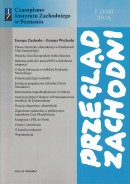Dwujęzyczne tablice z nazwami miejscowości na Opolszczyźnie: przejaw demokracji czy źródło nowych konfliktów?
Bilingual Place Names Plates in the Opole Region: A Manifestation of Democracy or a Source of New Conflicts
Author(s): Monika ChorośSubject(s): Politics / Political Sciences
Published by: Instytut Zachodni im. Zygmunta Wojciechowskiego
Summary/Abstract: The law on national and ethnic minorities and regional language passed by the Polish Parliament regulates the rules of introducing additional place names and street names in German. It was commonly expected that adoption of this law would solve the problems, abate the emotions and mitigate apparent controversies connected with the expression of distinctness by national minorities. An attempt to describe the introduction of German places names in Upper Silesia is presented against the background of similar experiences in Poland and Europe. They show that the problem of bilingual place names is related to the emotional rather than the pragmatic sphere of life and is a visible element of the ‘‘policy of remembrance’’. The most intense emotions and discussions were triggered by the introduction of additional names in German and Lemko. This demonstrates that the baggage of a troubled past has an enormous significance for the way in which those minorities are perceived today.
Journal: Przegląd Zachodni
- Issue Year: 341/2012
- Issue No: 01
- Page Range: 127-142
- Page Count: 16
- Language: Polish

